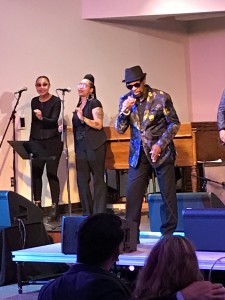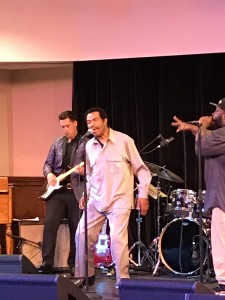 Since Martin Shore released his 2014 documentary “Take Me to the River,” telling the story of Memphis soul while trying to introduce a hip hop generation, a number of its featured artists have died, including Bobby “Blue” Bland, Hubert Sumlin and Teenie Hodges.
Since Martin Shore released his 2014 documentary “Take Me to the River,” telling the story of Memphis soul while trying to introduce a hip hop generation, a number of its featured artists have died, including Bobby “Blue” Bland, Hubert Sumlin and Teenie Hodges.
But three other of its featured participants went on to win their first Grammys this year — singer and songwriter William Bell, bluesman Bobby Rush and producer Boo Mitchell.
The latter three are now part of a touring version called “Take Me to the River: Memphis Soul and Rhythm & Blues Revue National Concert Tour” that gave a taste of what they can do before a receptive but reserved audience at the Smithsonian’s Museum of American History Tuesday.
The event, which included snippets from the film that can now be found on Netflix, also offered BBQ, drinks and a formal presentation to the Smithsonian of the spangly green suit Rush wore about the time of “Porcupine Meat”, what he calls his 374th album, which got him his first Grammy in February.
But once the Hi Rhythm Section got on stage with the Stax Academy Alumni, the main event began, largely with familiar tunes made hits by Al Green and Otis Redding. (The director Shore was also on stage, adding negligible additions on conga).
Usually when this many members of the Hi Rhythm Section are in D.C. and start kicking into “Let’s Stay Together,” you always hope in your heart of hearts that city resident Barack Obama will step up to the mic and unleash his falsetto, as he famously did at a 2012 fundraiser at the Apollo Theatre.
Instead, the lead vocals tended to be by workmanlike vocalists who were of the type you’d see on “The Voice” than in a juke joint. Things livened up, though, when Frayser Boy, formerly of Three 6 Mafia, strolled on stage to add a rap to “Sitting on the Dock of the Bay.”
The Memphis rapper, formerly known as Cedric Coleman, had brief fame in 2006 when the group’s “It’s Hard Out Here for a Pimp” won an Academy Award for best original song for its use in the movie “Hustle & Flow.” Proud of his achievement, Frayser Boy literally wears his Oscar on his sleeve with a tattoo of the golden statue on his forearm.
A second Memphis rapper, Alphonso Bailey, or Al Kapone, came on to add some rhymes on “Try a Little Tenderness.” Otis Redding never knew he had so many friends (or that his songs needed such additional rhymes).
 The combinations continued when the spry Rush, at 82, came to the stage to do “Push and Pull,” with Frayser Boy adding his flow.
The combinations continued when the spry Rush, at 82, came to the stage to do “Push and Pull,” with Frayser Boy adding his flow.
Rush followed with the title song from his album, which he interrupted it with a solo rendition of the down-home “I Got Three Problems,” accompanied by harmonica. “I got a problem with my woman, my girlfriend and my wife.”
If Rush was getting a little too lascivious for the Smithsonian, then Bell was the perfect fit.
The soul man whose first hit, “You Don’t Miss Your Water” came 56 years ago, and helped write “Every Day Will Be Like a Holiday” and ““Born Under a Bad Sign,” came back with a vengeance last year with “This Is Where I Live,” which won the Grammy in February for Best Americana Album.
His too-brief two-song set, though, delved into his past, starting with a rendition of “Private Number,” his 1968 duet with Judy Clay and then slowing the groove (explaining “I’m a ballad singer”) on an epic version of his classic from that same year, “I Forgot to Be Your Lover.”
Its luxurious groove has been the basis of tracks from Dilated Peoples’ “Worst Comes to Worst” to Ludacris’ “Growing Pains” and Killah Priest’s “One Step.” (Billy Idol’s stab at it, retitled “To Be a Lover,” went pretty far afield and didn’t hint at the original’s pleasures).
“I Forgot to Be Your Lover,” as it happens, is also a centerpiece of the “Take Me to the River” movie, in which a group of young musicians at the academy pick up and record it in a half hour (the same time it takes Snoop Dogg to write and record his trifling rhyme).
Bell, at 78, still does it best by himself, slowing it down at the concert into a groove, drifting over to Sam Cooke territory with a bit of “You Send Me,” and winding it all back up again in a singular performance that hinted at the full splendor of Memphis soul heyday.
But then it was time to go, after a full cast coda of the Al Green title song to the movie, to drive the full promotional message home one more time.